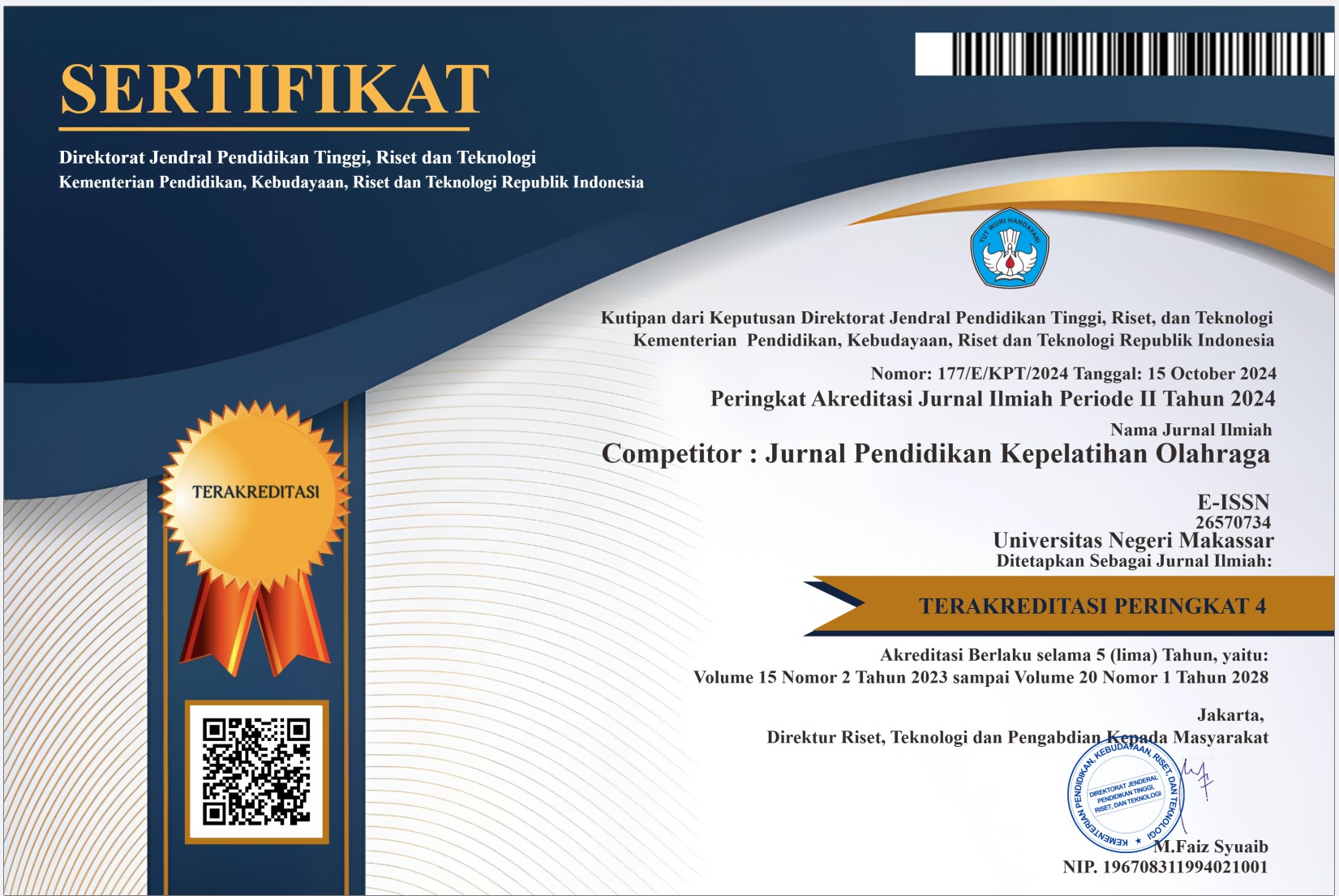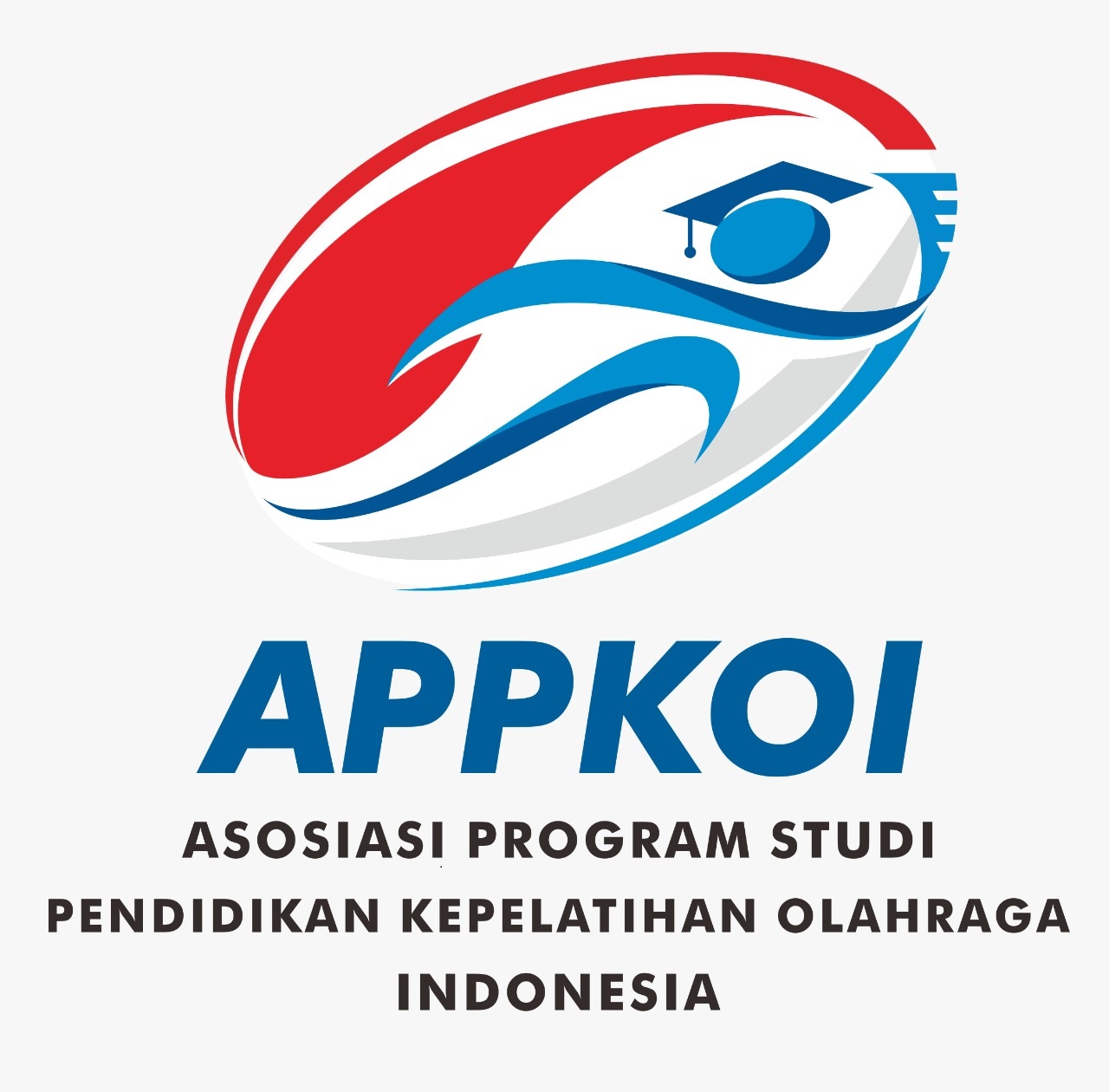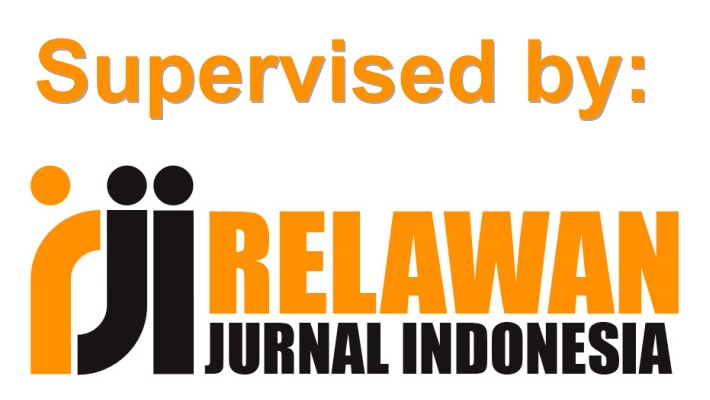The Relationship Between Self-Confidence And Motivation To Peak Performance Of Soccer Club Athletes Persipa Pati
DOI:
https://doi.org/10.26858/cjpko.v17i2.73893Keywords:
self-confidence, motivation, peak performance, soccer athlete, psychological aspectAbstract
This study aims to analyse the relationship between self-confidence and motivation with the peak performance of football athletes at Persipa Pati Club. The study is grounded in the understanding that psychological aspects play a crucial role in achieving optimal athletic performance, with self-confidence and motivation being two of the most significant internal factors influencing performance outcomes. A descriptive quantitative approach was employed, involving a total of 21 athletes from Persipa Pati Club as research participants. Data were collected using standardised and validated questionnaires, and statistical analysis was conducted using the Spearman Rank correlation test through SPSS software version 29. The results revealed a significant and positive relationship between self-confidence and peak performance (r = 0.671; p = 0.001), as well as between motivation and peak performance (r = 0.674; p = 0.001). These findings indicate that athletes who possess higher levels of self-confidence and motivation are more likely to achieve their peak performance in competitive environments. The strong correlations also highlight the importance of psychological readiness alongside physical and technical preparation in football. As a practical implication, it is recommended that coaches and club management integrate psychological training, such as mental skills development and motivational strategies, into their regular programs. By doing so, athletes can maintain psychological resilience and consistent high-level performance throughout the season. This study contributes to the growing literature on sports psychology in Southeast Asian football settings, particularly within regional clubs.
References
Adhiyasya, R., & Nur, A. (2025). Analisis Kegagalan Klub Paris Saint-Germain Mencapai Puncak Sepak Bola Eropa Meski Berinvestasi Besar. Journal ANC, 1(1), 66–78. https://journal.anc-aryantonurconsulting.com/tp/article/view/13
Agus, R. M., & Fahrizqi, E. B. (2020). Analisis tingkat kepercayaan diri saat bertanding atlet pencak silat perguruan satria sejati. Multilateral: Jurnal Pendidikan Jasmani Dan Olahraga, 19(2), 164–174. https://ppjp.ulm.ac.id/journal/index.php/multilateralpjkr
Aji, A. T., & Wahyudi, H. (2021). Pengaruh Latihan T-Sprint Terhadap Peningkatan Kelincahan Pemain Sepak Bola Di Ssb Mitra Fc U-19 Kabupaten Sumenep. Jurnal Kesehatan Olahraga, 9(4), 183–192. https://ejournal.unesa.ac.id/index.php/jurnal-kesehatan-olahraga/article/view/42785
Ali, M. M. (2022). Metodologi penelitian kuantitatif dan penerapan nya dalam penelitian. JPIB: Jurnal Penelitian Ibnu Rusyd, 1(2), 1–5. http://ojs.stai-ibnurusyd.ac.id/index.php/jpib/article/view/86
Aliyyah, A., Wicaksono, B., Saniatuzzulfa, R., & Mukholid, A. (2020). Relevance of self-efficacy and female futsal athletes’ anxiety before the match. Jurnal SPORTIF: Jurnal Penelitian Pembelajaran, 6(1), 105–117. https://ojs.unpkediri.ac.id/index.php/pjk
Appleton, P. R., & Duda, J. L. (2016). Examining the interactive effects of coach-created motivational climate and self-determined motivation on athlete burnout. Journal of Sports Sciences, 34(18), 1798–1809.
Apriansyah, B., Sulaiman, S., & Mukarromah, S. B. (2017). Kontribusi motivasi, kerjasama, kepercayaan diri terhadap prestasi atlet sekolah sepakbola Pati Training Center di Kabupaten Pati. Journal of Physical Education and Sports, 6(2), 101–107. https://journal.unnes.ac.id/sju/jpes/article/view/17358
Aulia, F. R. (2022). Hubungan Self-Talk Dan Kepercayaan Diri Dengan Peak Performance Pada Atlet Bulutangkis. Jurnal Keolahragaan JUARA, 2(2), 19–28. https://e-journal.upr.ac.id/index.php/juara/article/view/5293
Bandura, A. (1997). Self-efficacy: The exercise of control. W.H. Freeman.
Deci, E. L., & Ryan, R. M. (2000). The "what" and "why" of goal pursuits: Human needs and the self-determination of behaviour. Psychological Inquiry, 11(4), 227–268.
Fauzan, H. A., Komarudin, K., Tafaqur, M., & Novian, G. (2021). Meningkatkan Kepercayaan Diri dan Hasil Pukulan Dropshot Melalui Latihan Self-Talk pada Cabang Olahraga Bulutangkis. Journal of Sport Coaching and Physical Education, 6(2), 121–139. https://journal.unnes.ac.id/sju/jscpe/article/view/51640
Gould, D., & Maynard, I. (2009). Psychological preparation for the Olympic Games. Journal of Sports Sciences, 27(13), 1393–1408. https://doi.org/10.1080/02640410903081845
Grova, R. S., Zaky, M., & Hamidi, A. (2024). Korelasi Antara Kepercayaan Diri Dan Peforma Puncak Pada Atlet Futsal Profesional. Jurnal Olahraga Dan Kesehatan Indonesia (JOKI), 4(2), 148–158. https://jurnal.stokbinaguna.ac.id/index.php/JOK/article/view/2671
Gucciardi, D. F., et al. (2015). Mental toughness as a performance asset in sport: Current status and future directions. International Review of Sport and Exercise Psychology, 8(1), 1–28.
Hatzigeorgiadis, A., et al. (2009). Self-talk and sports performance: A meta-analysis. Perspectives on Psychological Science, 4(4), 348–356.
Hays, K., et al. (2009). Sources of confidence in sport. The Sport Psychologist, 23(1), 1–17.
Herani, I. (2018). Mental toughness dengan peak performance pada atlet renang. Jurnal Ilmu-Ilmu Sosial, 10(2), 198–212.
Lailiyah, I. N., & Jannah, M. (2022). Hubungan Antara Kepercayaan Diri dengan Competitive Anxiety Pada Atlet Pencak Silat. Character Jurnal Penelitian Psikologi, 9(3), 23–33. https://ejournal.unesa.ac.id/index.php/character/article/view/45824
Lestari, A., & Dewi, R. C. (2022). Hubungan Kepercayaan Diri dan Motivasi Terhadap Peak Performance Pada Atlet Bola Basket di Kabupaten Jombang. Jurnal Kesehatan Olahraga, 10(3), 179–184. https://ejournal.unesa.ac.id/index.php/character/article/view/41165
Liew, G. C., et al. (2019). Predicting psychological readiness to return to sport in elite athletes. Journal of Sports Rehabilitation, 28(6), 573–579.
Mahoney, J., et al. (2016). Psychological skills of athletes. Journal of Applied Sport Psychology, 28(2), 210–226.
Mallett, C., Kawabata, M., Newcombe, P., Otero-Forero, A., & Jackson, S. (2007). Sport motivation scale-6 (SMS-6): A revised six-factor sport motivation scale. Psychology of Sport and Exercise, 8(5), 600–614. https://doi.org/https://doi.org/10.1016/j.psychsport.2006.12.005
Moritz, S. E., et al. (2000). Examination of the Sport Confidence Model. The Sport Psychologist, 14(4), 446–458.
Nisa, K., & Jannah, M. (2021). Pengaruh kepercayaan diri terhadap ketangguhan mental atlet bela diri. Character Jurnal Penelitian Psikologi, 8(3), 36–45. https://ejournal.unesa.ac.id/index.php/character/article/view/41165
Pelletier, L. G., et al. (2013). Assessment of motivation in sport: A review. Journal of Sport and Exercise Psychology, 35(1), 39–61.
Pratama, M. I. (2019). Pengaruh Kepercayaan Diri Terhadap Peak Performance Atlet Futsal Usia Remaja. UNIVERSITAS NEGERI JAKARTA. http://repository.unj.ac.id/3096/
Pujarina, F., & Kumala, A. (2019). Modal psikologi terhadap peak perfomance. TAZKIYA: Journal of Psychology, 7(2), 112–119. http://dx.doi.org/10.15408/tazkiya.v7i2.13468
Reilly, T., et al. (2008). Science and football (2nd ed.). Routledge.
Ryan, R. M., & Deci, E. L. (2017). Self-determination theory: Basic psychological needs in motivation, development, and wellness. Guilford Press.
Setiawan, E., Patah, I. A., Baptista, C., Winarno, M. E., Sabino, B., & Amalia, E. F. (2020). Self-efficacy dan mental toughness: Apakah faktor psikologis berkorelasi dengan performa atlet? Jurnal Keolahragaan, 8(2), 158–165. https://scholarhub.uny.ac.id/jolahraga/vol8/iss2/6/
Stanger, N., et al. (2018). Predicting performance in elite athletes: An integrated approach. European Journal of Sport Science, 18(2), 211–218.
Syaukani, A. A., Subekti, N., & Fatoni, M. (2020). Analisis tingkat motivasi belajar dan berlatih pada atlet-pelajar PPLOP Jawa Tengah tahun 2020. Jurnal Keolahragaan, 8(2), 117–125. https://scholarhub.uny.ac.id/jolahraga/vol8/iss2/2/
Triandis, H. C. (2001). Individualism-collectivism and personality. Journal of Personality, 69(6), 907–924.
Vallerand, R. J. (2010). Motivation in sport and exercise: A self-determination theory perspective. Canadian Psychology, 51(1), 72–80.
Vealey, R. S., & Chase, M. A. (2016). Self-confidence in sport: Conceptual and research advances. In Handbook of Sport Psychology (3rd ed.).
Wati, K. A., & Jannah, M. (2021). Hubungan antara kejenuhan dengan motivasi berprestasi pada atlet sepak bola. Character Jurnal Penelitian Psikologi, 8(3), 126–136. https://ejournal.unesa.ac.id/index.php/character/article/view/41205
Weinberg, R. S., & Gould, D. (2018). Foundations of Sport and Exercise Psychology (7th ed.). Human Kinetics.
Wibowo, A. C., & Agustina, M. T. (2023). Hubungan Ketahanan Mental Dengan Performa Puncak Atlet Sepakbola Di Kota Semarang. IMAGE, 3(2). https://unaki.ac.id/ejournal/index.php/image/article/view/574
Widiasworo, W. (2020). Budaya lokal dan psikologi olahraga. Jurnal Keolahragaan Indonesia, 12(1), 55–66.
Woodman, T., & Hardy, L. (2003). The relative impact of cognitive anxiety and self-confidence on sport performance: A meta-analysis. Journal of Sports Sciences, 21(6), 443–457.
Yusoff, M. S. B. (2019). The validity of psychological readiness measures in sports. International Journal of Sports Science & Coaching, 14(2), 187–198.
Zourbanos, N., et al. (2016). Self-talk in sport: Underlying mechanisms and performance outcomes. Sport, Exercise, and Performance Psychology, 5(3), 200–211.
Downloads
Published
Issue
Section
License
Copyright (c) 2025 Yudha Pratama, Danang Aji Setyawan, Fajar Ari Widiyatmoko (Author)

This work is licensed under a Creative Commons Attribution 4.0 International License.



















